If you sleep outside without a tent when camping, you are exposed to insects, snakes, scorpions, and natural elements. So it is best to use some sort of shelter. Keep reading.
The question in the title is about safety and it would be necessary to know what exactly this means. The question also implies that a tent offers safety, whatever this may mean.
So it is hard to answer properly when we do not know what the topic is, but let’s see what could be said about safety and outdoor sleeping.
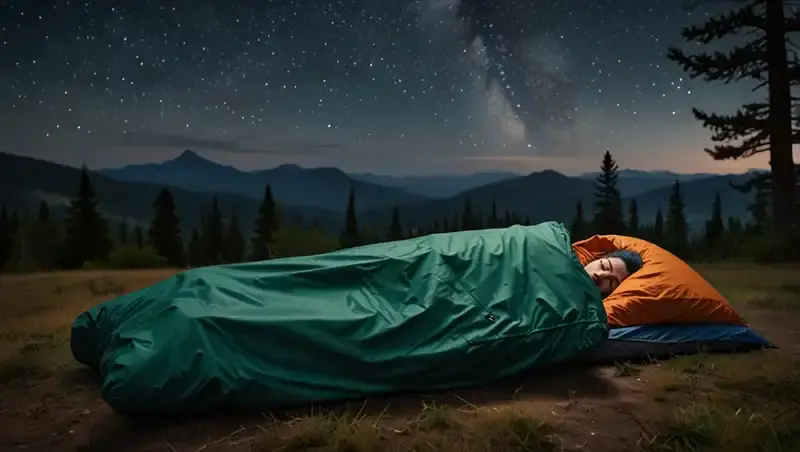
Is it safe to sleep outside without a tent when camping?
Here are a few possible answers:
♦ If this is about safety against insects, scorpions, and snakes, then the answer is that a tent is a great option. However, this is not the only option, and you can do without a tent.
For example, there are also camping screens without a fly that offer the same level of protection. Yet another option is using a tent-cot, a structure where you have a cot for off-ground sleeping and it has a tent fixed on it.
♦ If this is about safety regarding wild animals, the answer is: a tent will not protect you, so better forget it. It is much safer to sleep in the car.
To realize what I mean have a look at this situation with a bear outside of a tent, you would not like to be in such a place.
♦ If safety means protection against rain and wind, then the answer is no, you should have a tent or a tent-cot.
♦ If safety means protection from the cold, then the answer is: a tent will hardly protect you from the cold. Only a true winter tent can offer some protection of this type. You can read more about this in my separate text.
For protection from cold, you need a warm sleeping bag and a sleeping pad with a high R-value.
So you see, there are several possible answers and this all depends on what the topic is. I am just guessing.
But there are several similar and related questions that may help in getting a true answer on the main question in the title above, here are some of them:
Can you sleep outside in just a sleeping bag?
The short answer is yes.
But this text is about ‘safety of sleeping outdoor’ as you see from the main title. So you will have no protection from animals of any sort.
In addition, your sleeping bag becomes compressed with your body, so it loses its insulation property, this is a well-known fact. Therefore, unless this is about a warm weather camping, you will be cold from the ground.
No need to stress that the ground can hardly be comfortable, so having a pad is a must.
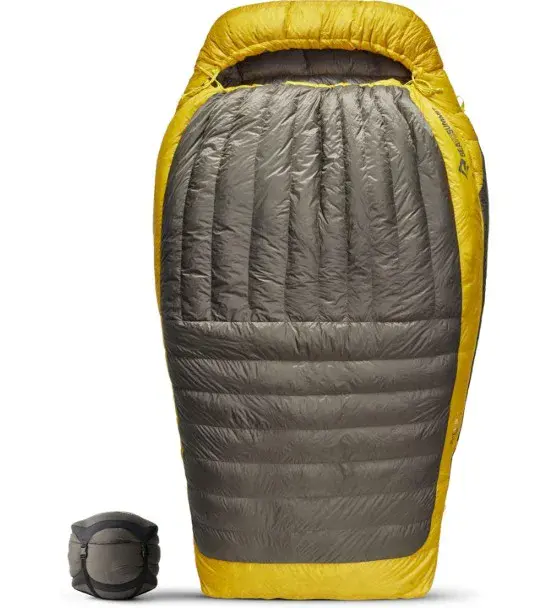
How cold can you sleep outside without a tent?
I already mentioned above that a tent will not protect you from the cold, but your sleeping bag and your sleeping pad will.
If you really need a tent that will protect you from the cold, this must be a specially designed winter tent. But even in this case, the temperature difference will be maximum around 5 degrees Celsius or so. Read more in my text How much warmer is a 4 season tent.
Can you sleep on the ground camping?
The answer is yes. But…
In terms of safety which is the topic here, is this wise? The answer is no. You are exposed to insects, snakes, scorpions, cold. Do you need more reasons?
What can I use instead of a tent?
I already mentioned a tent cot. This means you are off the ground yet protected with the roof. So this is protection against insects and again elements. The picture below shows one great example, the Kamp-Rite Compact Double Tent Cot.
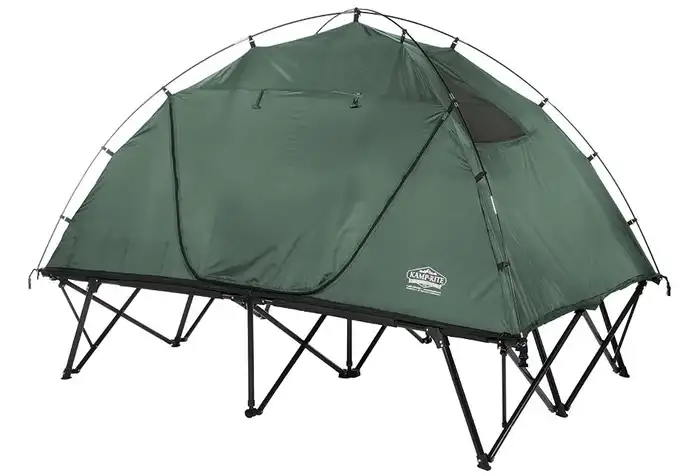
You can also sleep in the car as I frequently do. In terms of safety regarding wild animals, as mentioned above this is the best option.
Yet another option is a hammock. This is for people that sleep on the back, and also for places where you have trees. So this is not an option for high mountains.
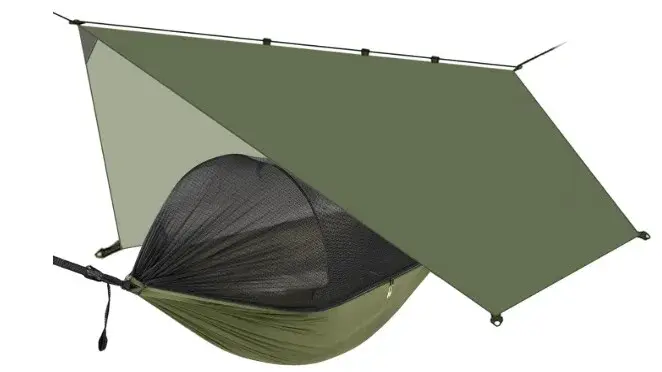
A bit more about the topic of the text: What data show
Comprehensive, up-to-date statistics on the specific scenarios, like hikers and campers killed by wild animals in tents, by elements like floods or lightning in tents, or by snakes and scorpions while sleeping in or out of tents, are sparse and often not tracked with precise detail in public datasets.
The available data tends to focus on broader categories (e.g., total wildlife-related deaths or weather-related fatalities) rather than the exact context of tent camping or open sleeping.
Below, I’ll provide the most relevant information from credible sources, supplemented with analysis to address the focus of the article.
1. Hikers and campers killed by wild animals in tents
Fatal attacks by wild animals on campers sleeping in tents are exceedingly rare, but they do occur.
The data suggests that bears, particularly grizzly and black bears, are the most likely culprits in North America, though other animals like mountain lions or wolves have been implicated in isolated cases.
Estimate: Based on NPS data and studies, approximately 0–2 fatal animal attacks occur annually in U.S. national parks, with only a fraction (likely <0.5 per year) involving campers in tents. Over a decade, this might equate to 2–5 tent-specific fatalities, primarily from bears.
Sleeping without a tent could theoretically increase visibility to predators like bears or mountain lions, as tents provide a psychological and physical barrier.
However, the “out of sight, out of mind” effect is less significant than proper food storage, which is the primary attractant for bears.
Sleeping in the open might slightly elevate risk, but the baseline probability remains low, on the order of 1 in 50 million for a fatal bear attack during camping.
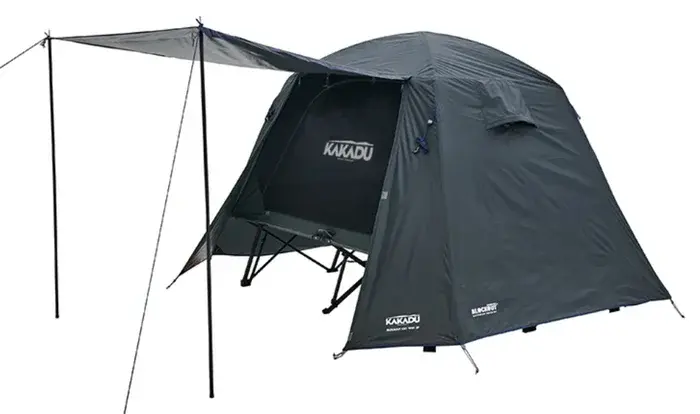
2. Hikers and campers killed by elements in tents (floods, lightning, etc.)
Weather-related fatalities, particularly from floods, lightning, and high winds, pose a greater risk to campers than wildlife. Tents offer limited protection against these elements, and specific incidents highlight the dangers.
Lightning: Lightning kills approximately 45 people annually in the U.S., with 4–5 hikers or campers among them.
Campers in tents are particularly vulnerable due to ground current (50% of lightning injuries) or side splash (30%), which can strike up to 60 feet from the impact point.
A 2020 Canadian study noted that over 65% of lightning injuries occur during outdoor recreation, with campers and hikers often struck in open areas or under trees.
Specific tent-related fatalities are not well-documented, but lying in a tent during a thunderstorm maximizes risk due to lack of grounding. An estimated 1–2 campers per year may die in tents from lightning, based on the proportion of outdoor recreation deaths.
Floods: Flash floods are a significant hazard, particularly in desert or canyon camping. Drowning is the second-leading cause of outdoor deaths, with water-related incidents (including flash floods) killing dozens annually.
NPS data from 2007–2013 indicates that drowning, including flood-related incidents, is a top cause of death in national parks, though exact tent-specific cases are not isolated.
A 2019 Business Insider article highlights flash floods as a key risk for campers in dry areas, with no specific fatality count but noting their sudden onset.
Estimate: Given that 20% of national park fatalities involve water (including floods), and considering the 120–140 annual park deaths, approximately 24–28 flood-related deaths occur yearly, with a subset (perhaps 2–5) involving campers in tents caught in flash floods.
High winds and falling trees: High winds can cause tent stakes to dislodge or tents to collapse, leading to rare but dramatic fatalities.
A 2011 incident in Denmark saw a camper killed by a flying tent stake, and in New Zealand, a woman died when her tent was lifted and slammed down.
Falling trees are a notable risk. A 2022 incident in Olympic National Park saw a 34-year-old camper killed by a tree falling on his tent.
Estimate: Falling trees or wind-related incidents likely cause 1–3 camper deaths in tents annually, based on sporadic reports and NPS data.
Tents provide minimal protection against lightning, floods, or falling trees, and sleeping without a tent could expose campers to these risks similarly or slightly more due to lack of even a thin barrier.
However, site selection (e.g., avoiding low-lying areas for floods or isolated trees for lightning) is far more critical than tent use.
The risk of death from elements is higher than from wildlife, with lightning and floods being the most significant threats, potentially affecting 5–10 campers in tents annually.
3. Hikers and campers killed by snakes and scorpions when sleeping in or out of tents
Venomous snakes and scorpions pose a low but non-zero risk to campers, with fatalities being extremely rare. The data focuses on bites rather than sleeping-specific incidents, but some inferences can be made.
Snakes: In the U.S., 7000–8000 venomous snakebites occur annually, with 5–6 fatalities.
Among the 40 million annual campers, this translates to a 1 in 50 million chance of a fatal snakebite.
NPS data from 2007–2013 records one snakebite death, not necessarily in a tent.
Snakes are unlikely to enter tents unless attracted by food scraps or small prey (e.g., mice). Keeping tents zipped and food stored away minimizes risk.
Sleeping without a tent (e.g., cowboy camping) may increase exposure, as snakes seek warmth and could crawl into sleeping bags. Anecdotal reports mention snakes in sleeping bags, but no fatalities are documented.
Estimate: Fatal snakebites while sleeping (in or out of tents) are likely fewer than 1 per year, given the low overall fatality rate and rarity of sleep-specific incidents.
Scorpions: Scorpion stings are common in desert regions, but fatalities are extremely rare. The CDC reports fewer than 1 death per year from scorpion stings in the U.S., typically involving children or allergic individuals.
Campers in areas like Southern Utah or Arizona report scorpions near tents, but no fatalities are documented.
Sleeping without a tent could increase risk, as scorpions are nocturnal and may crawl onto warm bodies. A 2017 Reddit thread mentions a camper stung by a scorpion while tarp camping, but the sting was non-fatal.
Estimate: Scorpion-related deaths while sleeping are effectively zero, with perhaps 0–1 every few decades.
Tents offer some protection against snakes and scorpions by acting as a barrier, especially if zipped and free of holes. Sleeping in the open increases the chance of a bite or sting, particularly in snake- or scorpion-heavy regions like Texas or the Southwest.
However, the risk of death is negligible, and precautions like shaking out sleeping bags and avoiding cluttered campsites are highly effective.
Final thoughts
Sleeping outside without a tent is generally safe, as the risks of fatal animal attacks, weather-related deaths, or venomous bites are statistically minute. However, tents provide a psychological and minor physical barrier, particularly against snakes, scorpions, and curious animals.
The biggest dangers, lightning, floods, and falling trees, are not significantly mitigated by tents, so campers should prioritize site selection, weather awareness, and food storage over tent use.
Sleeping under the stars can be a rewarding experience with minimal added risk if these precautions are followed.
So this is what I had to say about safety related to outdoor sleeping. I may have missed to say something important, and if so please let me know, there is a comment box below. Thank you for reading and have a bice day.
FAQ: Sleeping Outside Without a Tent When Camping
Is it safe to sleep outside without a tent in terms of protection from insects, snakes, and scorpions?
Tents provide a physical barrier against insects, snakes, and scorpions, reducing the risk of bites or stings. Alternatives like camping screens or tent-cots offer similar protection while keeping you off the ground.
Sleeping in the open may increase exposure, especially in snake- or scorpion-heavy regions like the Southwest, but fatalities are extremely rare (less than 1 per year for snakebites, near zero for scorpions).
Precautions like zipping tents, shaking out sleeping bags, and keeping campsites clean minimize these risks.
How effective is a tent in protecting against wild animals compared to sleeping outside?
Tents offer no significant protection against large wild animals like bears or mountain lions, as they can easily tear through fabric. Sleeping in a car is far safer in areas with predators. Fatal animal attacks on campers in tents are rare, with an estimated 0–2 per year in U.S. national parks, mostly involving bears.
Sleeping without a tent might slightly increase visibility to predators, but proper food storage is far more critical than tent use for safety.
Can sleeping outside without a tent protect you from weather-related risks like rain, wind, or cold?
Sleeping without a tent leaves you fully exposed to rain, wind, and cold, making a tent or tent-cot a better option for weather protection. Tents provide minimal warmth (only 5°C difference in true winter tents), so a warm sleeping bag and high R-value sleeping pad are essential for cold weather.
Lightning and flash floods, which kill an estimated 5–10 campers annually, pose significant risks regardless of tent use. Proper site selection, like avoiding low-lying areas or isolated trees, is crucial for safety.
Leave a Reply